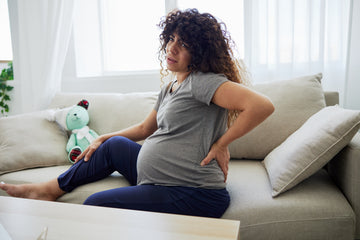Waiting for a new baby to come is filled with anticipation and excitement. The body goes through many changes during pregnancy, leading to a variety of unforeseen aches and pains. For expectant mothers, muscle pain in pregnancy is a reality that many experience during this time.
Understanding the causes and implementing effective remedies can help reduce the amount of discomfort that pregnancy muscle pain brings. In this article, we will look at the common causes of pregnancy-related muscle pain and explore safe and practical remedies to help expectant mothers overcome their muscle pain.
Common Causes of Pregnancy Muscle Pain
An expectant mother’s body goes through a lot of changes when a baby is on the way. These hormonal and physical changes can cause muscle pain that runs the entire length of their bodies. A common discomfort is restless leg syndrome while pregnant, which can create pain and discomfort in the legs of pregnant women.
If you are experiencing muscle pain during pregnancy, one of these common causes could be a contributing factor:
- Hormonal changes: Hormonal fluctuations, particularly elevated levels of relaxin, a reproductive hormone produced by the ovaries and placenta, can loosen ligaments and joints in preparation for childbirth. While this is essential for accommodating the growing baby and facilitating delivery, it can also lead to instability and muscle strain, particularly in the pelvis and lower back.
- Weight gain: As the pregnancy progresses, the body naturally gains weight to support the growing fetus. This additional weight puts extra stress on muscles, especially those in the back, abdomen, and legs, leading to fatigue and discomfort.
- Posture shifts: As the uterus expands, the body adjusts its posture to accommodate the growing belly. This can lead to changes in the curvature of the spine, causing strain on the back muscles and contributing to discomfort.
- Nutrient deficiencies: Inadequate intake of essential nutrients such as calcium and magnesium can make muscle cramps and discomfort during pregnancy worse. These nutrients play crucial roles in muscle function and relaxation, and their deficiency can lead to increased muscle tension and pain.
Safe and Effective Stretches and Exercise for Muscle Pain in Pregnancy
Stretches targeting pregnancy muscle pain can be effective for expectant mothers who are experiencing discomfort. Practicing stretches can help to alleviate the tension the body experiences when it changes during pregnancy, including targeting areas prone to tightness, like the lower back, hips, and legs. Stretches can also increase muscle blood circulation, which delivers oxygen and nutrients and promotes relaxation and stress relief.
Gentle exercises during pregnancy can help promote strength and increase flexibility. Activities like prenatal yoga, walking, and swimming help to keep the body mobile and agile, alleviating tension and stiffness in the muscles.
Stretches to Reduce Muscle Pain During Pregnancy
Here are three stretches that expectant mothers can incorporate into their daily routine to help ease muscle pain during pregnancy:
- Pelvic tilts: Pelvic tilts can help alleviate lower back pain by strengthening the muscles of the lower back and abdomen. To perform pelvic tilts, lie on your back with knees bent and gently tilt the pelvis upwards, flattening the lower back against the floor.
- Cat-cow stretch: This yoga-inspired stretch helps relieve tension in the spine and stretch the back and abdominal muscles. Start on your hands and knees, arching your back upwards like a cat, then lowering your belly towards the floor while lifting your head and tailbone.
- Hamstring stretch: Tight hamstrings can contribute to lower back pain during pregnancy. To stretch the hamstrings, sit on the floor with one leg extended and the other bent. Lean forward from the hips, reaching towards the extended foot while keeping the back straight.
Gentle Exercises to Reduce Pregnancy Muscle Pain
Here are three gentle exercises that mothers-to-be can try to help reduce their muscle pain and stiffness during pregnancy:
- Prenatal yoga: Prenatal yoga offers gentle stretches and poses specifically designed to support the changing needs of pregnant women. It helps improve flexibility, strengthen muscles, and promote relaxation, all of which can alleviate muscle pain and discomfort.
- Walking: Walking is a low-impact exercise that provides cardiovascular benefits without putting undue stress on the joints. It also helps improve circulation and maintain muscle tone, which can reduce muscle pain and fatigue.
- Swimming: Swimming is an excellent exercise for pregnant women, providing a full-body workout while relieving pressure on the joints. The buoyancy of water supports the body and allows for gentle movement, making it an ideal way to alleviate muscle pain and stay active during pregnancy.
Supportive Tools to Alleviate Muscle Pain During Pregnancy
Sometimes, stretching and exercises alone are not enough to alleviate muscle pain during pregnancy. The use of specialized tools, like maternity belts or luxury massage chairs, can help increase stability and relaxation, easing associated pregnancy pain. If muscle pain continues after pregnancy, some of these tools can help improve postpartum back pain in new moms.
Some of the supportive tools that can be considered for pregnancy muscle pain relief are:
- Maternity belts: Maternity belts provide support to the abdomen and lower back, helping to distribute the weight of the baby more evenly and relieve strain on the muscles. They can also help improve posture and reduce discomfort associated with pregnancy-related muscle pain.
- Heating pads: Applying heat to sore muscles can help relax tension and alleviate pain. Heating pads or warm compresses can be applied to the affected area for 15-20 minutes at a time to provide relief from muscle aches and stiffness.
- Luxury massage chairs: Using an AI massage chair vs a traditional massage chair, like the Master Drive AI 2.0, incorporates features that can help reduce pregnancy muscle pain with a prenatal massage. Features like heat therapy, massage, and zero gravity help to target troublesome areas that pregnant women experience as their bodies change.
- Foam rollers: Foam rollers can be used to release tension in tight muscles and improve flexibility. Rolling gently over the affected muscles can help break up knots and adhesions, reducing pain and improving the range of motion.
When to Seek Professional Help for Muscle Pain During Pregnancy
Even though muscle pain during pregnancy is common, there are instances where it may indicate a more serious underlying issue. It's essential to seek professional help if you experience severe or persistent pain that does not improve with rest or self-care measures, pain that is accompanied by swelling, redness, or heat, or pain and discomfort that interferes with daily activities or impacts the quality of life. Any symptoms that mimic labor or involve vaginal bleeding should be addressed by a medical professional as soon as possible.
Finding Relief for Muscle Pain in Pregnancy Is a Journey
Whether an expectant mother is in her first trimester or days away from delivery – finding relief and relaxation from pregnancy muscle pain can make this time more enjoyable. From practicing simple stretches and exercises to bringing home a luxury massage chair, there is relief possible from the muscle pain experienced during pregnancy.
Remember to listen to your body, prioritize self-care, and seek professional help if needed to ensure a healthy and happy pregnancy experience.
Disclaimer: This content is not medical advice. Please consult with your healthcare professional when considering implementing changes to your health or workout routines to ensure it’s compatible with your needs.





